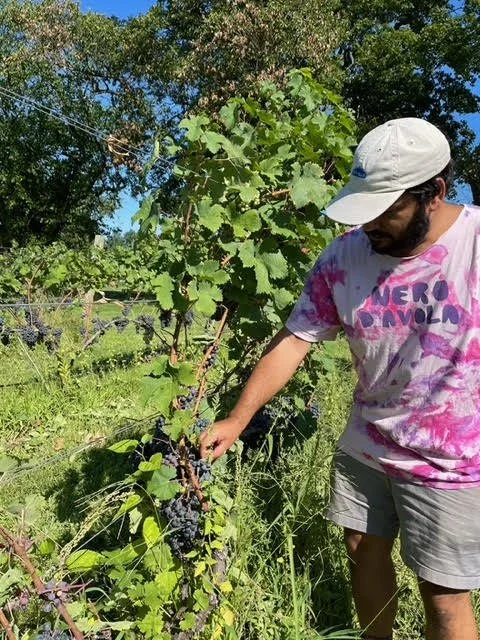Kosher Wine Explained: Insights from a Kosher Winemaker
Written by Camuna Cellars
Illustration by Cerise Zelenetz
As Rosh Hashanah approaches this weekend, Jewish communities eagerly anticipate gathering for festive dinners with family and friends to joyfully usher in the new year.
Amidst the beautifully-made meals, a special type of wine takes center stage – kosher wine. But what exactly is kosher wine? To demystify this question, we sought insights from both Jewish and non-Jewish individuals, some deeply immersed in the wine industry and others less so.
One friend in the wine industry remarked that they “don’t know sh*t about kosher wine, other than they’re all overly sweet and always pasteurized.” Another friend responded by asking, “don’t they all taste like Manischewitz?”
Kosher wine harbors a wealth of misconceptions, and in the spirit of fostering understanding, we've collaborated with our friends at Camuna Cellars to unravel these common myths. Together, we aim to improve the understanding that consumers have on the true meaning of kosher wine.
For those not familiar with Camuna Cellars, they are a Certified Kosher winemaker based out of Philadelphia, led by Eli Silins. Eli started making wine in California in 2013 and has long been interested in sustainable agriculture systems and the intersection of ancient and modern holistic farming practices.
In 2019, Eli moved from Berkeley, California to Philadelphia, Pennsylvania and took Camuna Cellars with him. He is currently exploring the bounty of the Mid-Atlantic and experimenting with grapes, apples, and honey and their various combinations... wine, cider, mead, cyser, pyment.
Understanding the History of Kosher Wine
In ancient times, wine held a significant role in pagan rituals, often used as an offering to idol gods. When favorable events occurred, it was customary to pour wine onto the ground as a symbolic gesture of gratitude. The rabbis responsible for establishing the guidelines for kosher wine were determined to ensure that Jews would never encounter a glass of wine linked to idolatrous practices. Consequently, they instituted a requirement that only individuals of Jewish faith could be involved in the handling of kosher wine.
Eli Silins, Camuna Cellars
To safeguard the sanctity of wine against idol worship, contemporary tradition dictates that only those who observe the Sabbath and adhere to kosher laws are permitted to handle it. This oversight is typically facilitated by a supervising rabbi affiliated with a Kosher Certifying Agency, who ensures compliance with all regulations and addresses any questions that may arise.
Remarkably, in the world of kosher winemaking, the day-to-day supervisor is none other than the mashgiach (on-site supervisor) rather than an off-site authority, as is common in the restaurant industry. In the meat industry, there is always a mashgiach present; the difference in winemaking is that the mashgiach themselves perform the duties rather than merely observing and checking that standards are met.
Mevushal vs. Non-Mevushal Wine
It's important to recognize that not all kosher wine undergoes cooking, and those that do don't have strict handling restrictions and can be handled by anyone. These wines are labeled as "mevushal," meaning "cooked." In practice, mevushal wine is subjected to flash-pasteurization, a brief, high-temperature treatment of the grape must (the destemmed and crushed product) and, in some cases, the finished wine.
In contrast, non-mevushal wine remains uncooked and requires continuous supervision by a Sabbath-observant Jew during its entire production, handling, bottling, certification, opening, and pouring.
Historically, there was a belief that boiled wine lacked the same spiritual potency as "living" wine, making it unsuitable for idol worship or offerings in the holy temple, as it was considered to be more susceptible to "energetic influence." However, modern approaches lean towards alternative methods like flash pasteurization, showcasing the adaptability of kosher winemaking practices.
Rules Governing Kosher Wine
Kosher wine, in its simplest form, adheres to specific rules governing the ingredients used and the production process. It must exclude non-kosher ingredients, such as isinglass or gelatin, during production. For wines intended for Passover, even stricter standards must be met.
Price Point
Kosher wine often carries a higher price compared to its non-kosher counterparts. This cost escalation is primarily driven by expenses related to obtaining kosher supervision and employing specialized labor in the production process. Securing Kosher Certification can be a costly endeavor, often amounting to thousands of dollars, which is subsequently reflected in the per-bottle pricing.
Dispelling the Sweetness Myth
It's essential to dispel the misconception that all kosher wines are sweet. This misunderstanding stems from various historical factors:
Jewish diasporas led to diverse wine-producing regions, not all suitable for cultivating wine grapes. Some regions developed a tradition of crafting raisin wine, known for its inherent sweetness.
Early successful wine production in the United States centered around concord grapes, which have a natural sweetness.
Kosher wine is a product deeply rooted in tradition and spirituality, with strict guidelines to maintain its sanctity. It's a diverse category with variations in production methods and flavors, and it's essential to debunk misconceptions surrounding it, providing a clearer understanding of this unique wine genre.


